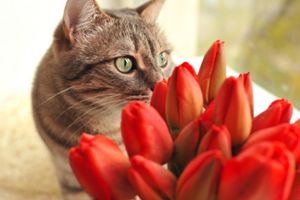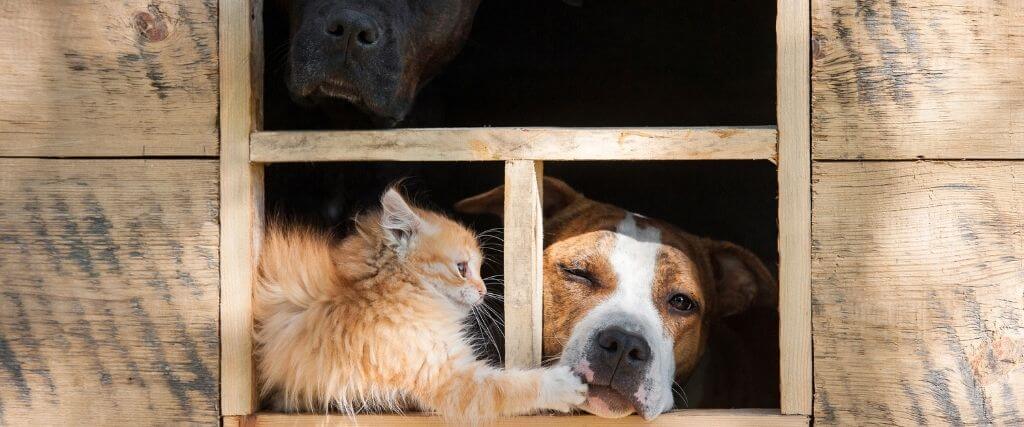National Pet Poison Prevention Week takes place this year from March 21st through March 27th. Aimed at educating pet parents about some of the most common things that are poisonous to pets, this week is a fantastic opportunity to brush up on your knowledge and keep your furry family member safe. While cleaning chemicals and rodenticides are more obvious hazards to pets, there are also a lot of seemingly innocent household poisons that could put your pet’s health at risk.
As veterinarians, we never want animals to suffer from accidental poisoning. Unfortunately, these situations are much more common than most animal owners realize. It takes mere seconds for a curious pet to ingest something they shouldn’t, and the consequences can be devastating. Familiarize yourself with the following common household poisons to keep your furry friend out of harm’s way! We also encourage you to check out Pet Poison Hotline to learn about even more pet poisons.
Plants
Plants are a lovely way of breathing life and fresh air into your home. Unfortunately, they can also be harmful to pets. In particular, several common spring flowers are toxic.
Plants that are toxic to dogs and cats include:
- Aloe Vera
- Chrysanthemums
- Daffodils
- Hydrangeas
- Lilies
- Tulips
Aloe Vera is renowned for its burn-soothing capabilities. If eaten by your dog or cat, though, it can cause vomiting, diarrhea, and lethargy.
Also known as mums, chrysanthemums contain toxic elements that can cause diarrhea, vomiting, incoordination, dermatitis, or hypersalivation.
Daffodils are toxic to dogs and cats and can cause diarrhea, hypersalivation, and vomiting. Ingesting large enough quantities can cause low blood pressure, convulsions, cardiac arrhythmias, and tremors. The bulbs are the most toxic part of the daffodil plant.
Commonly seen brightening up landscapes in the spring and early summer, hydrangeas cause gastrointestinal disturbances in pets, including vomiting and diarrhea. They can also cause depression.
While lilies typically only cause mild stomach irritation in dogs, they can be deadly to cats. Even licking a bit of their pollen or a small amount of the water from the vase can cause kidney damage, so seek veterinary care immediately if your cat ingests any part of a lily.
Another springtime favorite, tulips contain toxins that can cause severe gastrointestinal irritation, decreased appetite, drooling, depression of the central nervous system, cardiac abnormalities, and convulsions in dogs and cats.

Household Cleaning Products
When doing your spring cleaning, be mindful of the products you use around your pets. Most cleaning products and chemicals are toxic if ingested, so you should always store them out of reach. Avoid allowing your pet to come in contact with cleaned surfaces until they are completely dry.
Exposure to and ingestion of bleach can cause severe problems in pets. From mild skin irritation to chemical burns, it can do a lot of damage when misused. Diluted bleach is an excellent product for cleaning and disinfecting. Keep your pet away while using it, though, and make sure the area you’ve cleaned is fully dry and aired out before allowing them to return.
Though they are natural, essential oils can cause problems in pets, too — especially cats. If you use these in your home, familiarize yourself with unsafe and safe options for essential oils that you can use around pets. And when using safe oils, be sure to do so in a safe manner.
Ingestion or inhalation of essential oils can cause:
- Gastrointestinal upset
- Liver damage
- Respiratory distress
- Aspiration pneumonia
- Central nervous system depression
Human Medication
If your pet has an upset stomach or seems like they could be in pain, it’s tempting to reach for an over-the-counter medication from your medicine cabinet. Unfortunately, most human drugs are not safe for pets. And even those that are should only be administered with the guidance and supervision of a veterinarian.
Human medications you should never give your pet include:
Aspirin
Aspirin is an ineffective pain reliever for pets, and the minimal benefit it offers does not outweigh the potential risk. It’s very easy to give your dog or cat an overdose of this medication, which could cause stomach ulceration and liver failure.
NSAID Pain Relievers (Motrin, Advil, etc.)
Animals don’t metabolize NSAID pain relievers the same way as humans. While popping an Advil might help ease your arthritis, giving your dog one could cause kidney failure or ulcers.
Pseudoephedrine
Pseudoephedrine is found in many over-the-counter allergy medications and decongestants.
Pseudoephedrine can cause the following in pets:
- Increased heart rate
- Nervousness
- Hyperactivity
- Panting
- High blood pressure
Pepto Bismol
Never give your pet Pepto Bismol when they have an upset stomach. This medicine cabinet staple contains salicylates, which are similar to aspirin. For this reason, it can cause effects similar to those of aspirin poisoning. In large enough amounts, Pepto Bismol can cause ulcers, gastric irritation, seizures, liver problems, and bleeding problems in pets.
Closing Thoughts
If you ever have any reason to think your pet may have ingested something poisonous, this is a true emergency, so seek veterinary attention immediately. Even small amounts of poisonous and toxic substances can cause devastating problems, so the faster you act, the better. You can reach the Animal Poison Control Center 24 hours a day, seven days a week, by calling (855) 764-7661.
When you need expert veterinary care for your dog or cat, we are here to help. Call now to schedule an appointment.

